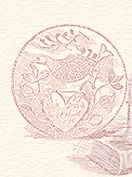|
Ihr
liewe Leit:
Darrich
der Winder 1998-1999 hen sie mehner
Schnee draus im Wescht ghatt ass yemols bevor, awwer do im Oscht saage oft
Leit ass mer nimmi so viel Schnee griege ass wie Yaahre zerrick.
Es kennt sei ass des dann un wann bassiert, weil schunn in 1878 hot der H. L. Fisher in seim Buch
Die Alde Ziede gschriwwe:
"Harrye!
Was waar der Schnee so dief In selle alde Zeide.
Wie kummt's dass ken so Schnee mehr gebt Wie in de alde Zeide."
(Do
will mer yuscht frooge wann "die alde Zeide" waare fer der Fisher!)
Awwer mer wisse ass es immerrnoch ab un zu do in
Pennsylveeni schneet. Mannichmol wisse mer gaar net ass es schneet bis mer
nausgucke odder nausgehne, der Schnee fallt so sanft. Awwer mannichmol brauche
mer gaar net nausgucke, der Wind un der Schnee kann mer eenicharriyets im Haus
heere.
Der
J. Max Hark (1849-1930) hot mol gschriwwe:
"Was
iss doch alles so ruich un schtill! Mer Heert ken Laut net im ganse Busch hie,
Net mol es gebiebs vumme glee Tschickedie, Kee Grapp, un kee Gschwall, Merharricht wie mer will."
"Ken
Lifdel riehrt sich; un's gebt eem en Gfiehl Ass wann die Welt mit allmechdicher Gewalt
Uff eemol nau sich der Oochdem haldt. Noh kummt der Schnee, awwer net imme Gewiehl;
Die Flocke kumme wie Feddre so leicht, Un eensel zuaerscht, awwer ball imme Gewewwer
Ass die Luft demit wimmelt. Datt drowwe nau schleicht,
En
Nachteil darrich die dick Luft, ass eb's waer En Gschpuuk, so weiss un so schtill. Un im Schee
Watt alles im Busch wie'n Geischderwelt schee."
Awwer der Eli Keller (1825-1919) hot mol
gschriwwe:
"Wie
doch der Schtarrem nau braust Un feegt un dobt un haust Darrich Barrig un Daal im ganse Land.
Wie wervelt er der Schnee Un draagt en in die Heeh Bis Hinnerfens un Fels un Wand.
"Viel
Schtroose sin net frei, Un's bloosst noch immer nei; Do iss---fer die Zeit---nix zu duh!
Mer sarrigt mit Drei un Mieh Fer sich un fer sei Vieh Un guckt debei---em Wedder zu!"
Awwer
besunners im Fischer seinre Zeit hot
viel Schnee en hallichi Zeit bedeidt---im Schlidde!
Macht's gut,
Der Alt Professer |
Dear
people:
During
the winter 1998-1999 they had more snow out in the west than ever before, but here in
the east people often say that we don't get as much snow now as we did years ago.
It could be that that happens now and then., because already in 1878 H. L. Fisher wrote in his
book The Olden Times:
"Good
Lord! How deep the snow was In those olden times.
How come there is no more such snow As in those olden times?"
(One
would lie to ask when "the olden times" were for Fisher!)
But
we know that it still snows here in Pennsylvania now and then. Sometimes we don't evenmknow that it is snowing until we look outside or go outside, because the snow falls so softly. But some-
times we don't have to look out. We can hear the wind and the snow anywhere in the house.
J.
Max Hark (1849-1930) once wrote:
"How
everything is so quiet and still! One hears no sound in the whole woods, Not even the peep of a small chickadee,
No crow and no squirrel, listen as one will.
"No breeze moves; and it gives one a feeling As if the world with almighty force
Suddenly holds its breath. Then comes the snow, but not in a tumult; The flakes come, come like feathers so lightly,
One at a time, at first, but soon bustling So that the air swarms with them.
Above now creeps an owl through the heavy air,
As if it were a spook, so white and still. And in the snow everything in the woods
Becomes a ghostly world."
But
Eli Keller (1825-1919) once wrote:
"How the storm now roars And sweeps and blusters and rages Through mountain and valley, in
the whole land. How it swirls the snow And carries it on high To back fence, and rocks, and wall.
"Many
streets are not clear, And it's still blowing in; There is---for the time being---nothing to do!
One cares with loyalty and trouble For oneself and for the animals, And looks at---the weather!"
But
particularly in Fisher's time a lot of snow
meant a glorious time---in the sleigh!
Take care,
The Old Professor |













